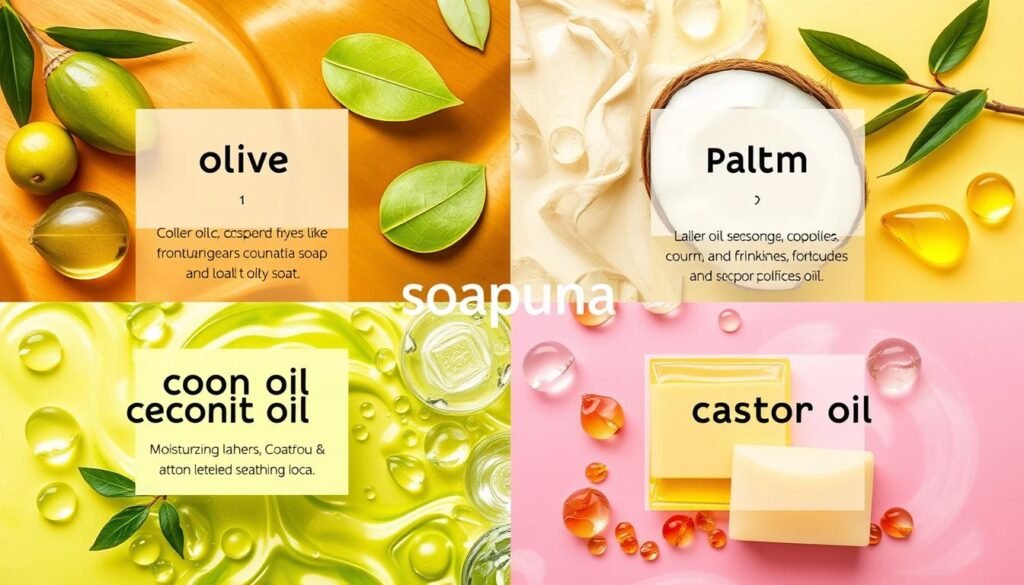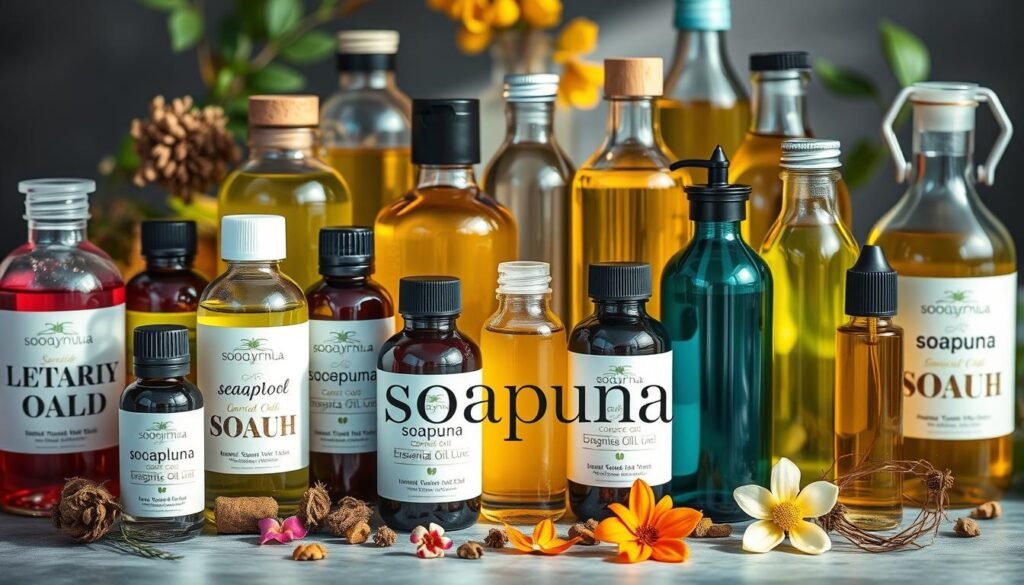Welcome to our guide on the best oils for soap making. If you’re new or experienced in soap making, picking the right oils is key. Each natural oil adds special benefits to your soap, making it better and more effective.
We’ll examine different oils and their benefits. You’ll learn about their properties and how they help make great soap. Knowing the best oils will help you make soaps that are not only clean but also good for your skin.
Key Takeaways
- Choosing the right oils enhances soap quality and benefits for the skin.
- Natural oils provide unique properties, from moisturizing to lathering.
- Understanding oil composition helps in formulating effective recipes.
- Well-balanced oils lead to better soap conditioning and longevity.
- Ethical sourcing of oils is essential in soap crafting.
Introduction to Soap Making
Soap making is a mix of art and science. It creates a product that’s good for your skin. We’ll look at how it started and how it’s changed over time.
The history of soap-making goes back thousands of years. It began with ancient civilizations. The Babylonians were the first to mix oils with alkaline substances, making the first soaps.
Historical Background of Soap Making
Soap making has a long and interesting history. The first soap uses were found in Babylon around 2800 B.C. Archaeologists found soap-like materials in ancient clay recipes.
Ancient Egyptians also used soap oils. They made mixtures for personal care and rituals. In the Middle Ages, soap making in Europe grew. Guilds were formed, leading to today’s soap making.
The Role of Oils in Soap Production
Oils are key in soap making. They help create the right texture and lather. Different oils, like coconut, olive, and palm, add unique qualities.
Coconut oil makes the soap lather well. Olive oil makes it moisturizing. Knowing this helps make soaps that meet specific skin care needs. Trying different oils lets you create soaps with various textures and benefits.

Understanding the best oils for soap
Choosing the right oils is key in soap making. It makes your products better and more fun to use. Knowing about soap-making oils helps you pick the best ingredients for your needs. Natural oils affect lather, moisture, and skin health.
The Importance of Choosing the Right Oils
Choosing oils for soap matters a lot. Each oil has special qualities that change the soap in different ways. For example:
- Coconut oil makes a creamy, bubbly lather, making it a favorite.
- Olive oil: It’s rich in oleic acid, which is great for dry or sensitive skin.
- Palm oil has palmitic acid, making the soap hard and lasting.
- Apricot kernel oil: Use it up to 15% to keep the bar hard.
Soap makers focus on these traits to make balanced and effective soaps.
Benefits of Natural Oils for Soap Making
Natural oils do more than clean. They make your soap better and healthier for your skin. Some great oils are:
- Hemp seed oil: Up to 15% adds moisture without weakening the bar.
- Mango butter: At 30%, it makes a hard bar with great lather.
- Sweet almond oil: Perfect at 20%, it improves the soap’s feel and nourishes.
Using oils like rice bran, shea butter, and walnuts can also enhance your soap. Wheat germ oil, for example, is great for skin at 10%. Sticking to recommended amounts ensures your soap turns out well.

| Oil Type | Recommended Usage (%) | Key Properties |
|---|---|---|
| Coconut Oil | Up to 20% | Produces a hard bar with a bubbly lather |
| Olive Oil | 20-50% | Moisturizes and softens the skin |
| Palm Oil | Up to 25% | Adds hardness and longevity |
| Apricot Kernel Oil | 15% | Maintains bar hardness and longevity |
| Hemp Seed Oil | 15% | Moisturizing benefits for skin |
Knowing about soap-making oils helps you make better soaps. Using natural oils is key to healthy skin and sustainable practices.
Characteristics of Good Soap-Making Oils
Knowing what makes good soap-making oils is key to making top-notch soaps. The right oils make the soap work better and feel nicer. They also make the soap good for your skin.
Stability and Shelf Life
Stability and shelf life are important for soap-making oils. Oils like palm and coconut oil are very stable, meaning they stay good for a long time, making your soap last longer.
Lather and Cleansing Properties
The lather of soap oils is super important. Oils like coconut and palm kernel oil make lots of bubbles, which makes the soap feel nice and clean.
Moisturizing Qualities
Using oils that moisturize is important for balanced soap. Good oils, like castor oil, make the skin soft. Mixing oils helps make sure the soap is gentle for everyone’s skin.

The Best Oils for Making Soap
Choosing the right oils is key when making soap. Each oil brings special qualities to your soap, which affect how the soap feels, lathers, and moisturizes. Let’s look at the top oils for homemade soap and their benefits. This will help you pick the best oils for your recipes.
Top Recommendations for Soap Making
Coconut oil, olive oil, and palm oil are the best for soap making. They each have unique qualities:
- Coconut oil has lots of lauric acid, making it great for a rich lather. You can use it up to 25% in your recipes.
- Olive Oil: It’s very moisturizing, and perfect for sensitive skin. You can use up to 40% of it in your recipes.
- Palm Oil: It makes soap bars hard and long-lasting. Use it in equal parts with other oils for a balanced recipe.
- Avocado Oil: It adds moisture, good for up to 10% in your recipes.
Comparison of Popular Oils
| Oil | Recommended Usage (%) | Key Benefits | Suitable For |
|---|---|---|---|
| Coconut Oil | 25 | Rich lather, stable | All skin types |
| Olive Oil | 40 | Moisturizing, emollient | Dry and sensitive skin |
| Palm Oil | 35 | Hardness, longevity | All skin types |
| Avocado Oil | 10 | Moisturizing, nourishing | Dry skin |
Unique Benefits of Each Oil
Each top oil for homemade soap has its benefits:
- Coconut Oil: It cleanses well and fights germs, making your soap more effective.
- Olive Oil: It’s full of antioxidants and soothes the skin, great for sensitive skin.
- Palm Oil: It has vitamins that help your skin and make your soap last longer.
- Avocado Oil: It’s rich in vitamins A and E, deeply hydrating and conditions the skin.

Additional Oils for Soap Crafting
Looking for the perfect soap? Try new oils for texture, scent, and skin benefits. Exotic and organic oils add to the feel and health of your soap.
Exploring Exotic and Organic Oils
Check out organic oils for soap making like babassu and hemp seed oil. Babassu oil moisturizes well and feels light. Hemp seed oil adds hydration and a creamy feel. These oils make your soap special.
Ethical Considerations in Oil Sourcing
Choosing oils wisely is key. Palm oil’s demand harms the environment. Use RSPO-certified palm oil for better farming. Knowing where your oils come from helps the planet and keeps nature-rich. Oils like sunflower and canola are good choices too.

| Oil Type | Benefits | Recommended Usage in Soap (%) |
|---|---|---|
| Babassu Oil | Moisturizes; non-greasy | Up to 20 |
| Hemp Seed Oil | Hydrating; creamy lather | Up to 15 |
| Coconut Oil | Rich lather; moisturizing | Up to 30 |
| Sunflower Oil | Gentle; suitable for all skin types | Up to 20 |
| Castor Oil | Moisturizing; creamy texture | Up to 10 |
Use different oils and choose them wisely for better soap. Enjoy the many benefits they offer in your soap-making journey.
Balancing Fatty Acids and Oil Properties
Making good soap means balancing fatty acids well. Knowing about fatty acid profiles is key to making a soap recipe that works for many skin types and tastes.
Each oil has its fatty acids. These acids are important for making your soap just right.
Creating a Well-Balanced Soap Recipe
A good soap recipe mixes oils for the best clean, moisturize, lather, and feel. Lauric acid from coconut oil cleans well. Using 7% to 20% lauric acid makes your soap strong.
Oleic acid, found in many recipes, moisturizes well. It keeps skin soft. Oleic acid is about 36% in many recipes.
Understanding Fatty Acid Profiles
To make great soap, know the fatty acid percentages in your recipe:
| Fatty Acid | Average Percentage | Common Percentage Range |
|---|---|---|
| Lauric Acid | 15% | 7% – 20% |
| Myristic Acid | 7% | 4% – 7% |
| Palmitic Acid | 15% | 10% – 20% |
| Stearic Acid | 7% | 3% – 8% |
| Oleic Acid | 36% | 32% – 41% |
| Linoleic Acid | 10% | 7% – 14% |
| Linolenic Acid | 1% | 0% – 1% |
| Ricinoleic Acid | 5% | 4% – 7% |
By balancing fatty acids, you make soap that cleans and conditions well. Choosing the right oils makes your soap do what you want it to.
Combining Oils for Optimal Results
Making soap is an art that needs the right mix of oils. Knowing how to mix oils helps make soap that works well. This part talks about how to mix oils to get the best results, like better lather and moisturizing.
Formulating for Desired Effects
When mixing oils for soap, focus on what each oil does. For example, using more coconut oil and palm kernel oil makes the soap bubbly. Hard oils make the soap last longer and feel harder. Here are some tips for mixing:
- 60% Hard Oils
- 25% to 45% Lathering Hard Oils
- 15% to 30% Conditioning Hard Oils
- 40% Soft Oils
- 20% to 30% Nourishing Soft Oils
- 5% to 10% Luxury Soft Oils
- 5% to 10% Castor Oil
These amounts make the soap clean well and feel nice on your skin.
Pairing Oils for Enhanced Lather
To make soap lather better, use certain oils. Adding 5% to 10% castor oil helps keep the lather stable. Some oils also make the soap moisturizing. Essential oils and citrus oils add smell and stability:
- Anise
- Basil
- Cedarwood
- Cinnamon
- Clove
- Oakmoss
- Peru balsam
- Vetiver
Remember, too much castor oil can make the soap sticky. Knowing how oils work lets you make soap that lathers well and feels good.
Best Oils for Skin Nourishment
Choosing the right oils is key for skin care. Each oil offers special benefits, great for making gentle soaps. It’s important to know the difference between essential and carrier oils for soap making.
Essential Oils vs Carrier Oils
Essential oils are strong extracts of plants that impart their scent and health benefits to soap. They add fragrance and health benefits but need to be mixed with carrier oils. Carrier oils like olive and sweet almond oil moisturize and nourish, making them perfect for gentle soaps.
The best oils for skin care often mix these types. This blend offers the most health benefits.
Popular Oils for Sensitive Skin
Some oils are great for sensitive skin, soothing and moisturizing. Olive oil is softened and packed with vitamins A, D, E, and K. It’s also less likely to cause allergies.
Sweet almond oil makes soaps feel better and is safe up to 20%. Jojoba oil is like human sebum, good for all skin types, including sensitive ones.
Rice bran oil adds lather but use it less than 20% to keep the soap hard. Shea butter makes soaps creamy and nourishing.
Recommended Oils for Soap Crafting
Making soap at home is fun, but picking the right oils is key. The right oils make your soap soft, moisturizing, and good to use. Here are some recommended oils for soap crafting to try. We’ll also talk about how to pick oils and common mistakes to avoid.
Key Considerations When Selecting Oils
When picking oils for soap, think about these things:
- Skin Type: Choose oils that fit your skin’s needs.
- Desired Effects: Pick oils for moisture, lather, and soap hardness.
- Usage Rates: Use each oil as recommended for the best results.
Below is a table with top oils for soap, how much to use, and their benefits:
| Oil | Recommended Usage Rate | Benefits |
|---|---|---|
| Almond Butter | Up to 20% | Improves texture and moisturizes well. |
| Olive Oil | Up to 100% | Moisturizes deeply; good for sensitive skin. |
| Coconut Oil | Up to 33% | Makes soap rich and bubbly. |
| Babassu Oil | Up to 30% | Moisturizes lightly; like coconut oil. |
| Shea Butter | Up to 15% | Softens and conditions skin. |
| Apricot Kernel Oil | 15% or less | Helps keep soap hard. |
Common Mistakes to Avoid
Knowing common soap-making mistakes helps you make better soap:
- Using too much oil can make soap soft or with low lather.
- Not choosing oils for your skin type can cause problems.
- Not thinking about oil stability can lead to rancidity or short shelf life.
Conclusion
Choosing the right oils for soap making is key to making great, nourishing bars. Each oil adds special qualities that make your soap better. For example, coconut oil makes soap lather well, while olive oil moisturizes.
Starting your soap-making journey lets you try different oil mixes. You can make soap that feels good, smells nice, or has lots of lather. With what you’ve learned, start making your soap blends. They’ll take care of your skin and meet your wellness needs.
Using natural oils for soap making is good for your skin and the planet. As you get better at making soap, remember it’s fun. You get to share your love of natural wellness with others.
